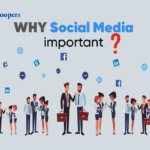In the digital era, businesses have multiple avenues to reach potential customers. Yet, one of the most impactful tools often under scrutiny is Google Search. With artificial intelligence deeply integrated into the internet, Google has adapted by incorporating more AI in its search results and updating its algorithms. While Google claims these changes aim to enhance user experiences, many businesses are grappling with declining site visits.
This decline is critical, given the straightforward truth: your audience conducts online searches before making purchasing decisions. So, where should your business be when they’re looking? That’s right—visible and accessible. Ranking high in search results is pivotal. Whether customers are researching products, reading reviews, or comparing options, your presence in their search results enhances the chance of engagement. This is where Search Engine Optimization (SEO) becomes a cornerstone of digital marketing. For entrepreneurs and digital marketers, SEO is indispensable for visibility and sustained growth. SEO has been an essential tool for over a decade, driving significant traffic for many successful websites.
Key Elements of SEO for Your Website

What is SEO?
Search Engine Optimization involves enhancing the quality and volume of organic traffic to your website. When implemented effectively, SEO boosts your visibility through unpaid and relevant search results. While SEO strategies often target search engines like Google, their true potential lies in understanding users. By addressing what people search for, their preferred content formats, and the terms they use, businesses can connect meaningfully with their audience. Websites loved by users gain Google’s favor. Win the trust of your audience, and your site could secure a top position in search results.
Laying the Groundwork: Branding
Before delving into SEO, it’s vital to establish a solid brand foundation. This includes your business name, logo, website design, and social media presence. Branding builds trust, attracts future customers, and enhances profitability. A distinctive logo is a core aspect of branding, helping your business stand out. Consider Nike’s iconic swoosh—it remains timeless and instantly recognizable. While some businesses refresh their logos periodically, creating a strong logo from the beginning can negate that need.
A visually engaging logo resonates more with users, as people tend to remember imagery over text. Today, designing an impressive logo is faster and easier than ever, thanks to advanced tools.
Why SEO is Crucial in Digital Marketing

SEO is a vital component of any digital marketing plan. While it requires effort and time, the long-term benefits make it invaluable. Here’s why:
1. Improved Rankings and Visibility
Users typically interact with the top 10 Google results. SEO helps your site rank on the first page for relevant searches, boosting your visibility and increasing the chances of engagement.
2. Increased Website Traffic
While paid ads can drive traffic, they’re not a sustainable long-term solution. Effective SEO attracts organic traffic by showcasing your site’s quality and relevance. Higher organic traffic leads to increased sales opportunities.
3. Credibility and Trust
Higher rankings not only boost visibility but also build trust. Being among the top results is like receiving an endorsement from Google, strengthening your credibility with users.
4. Enhanced User Experience
An intuitive website answers key questions about products, locations, payment options, and more. A user-friendly design improves navigation for visitors and helps search engines understand your content, ensuring a seamless user experience.
5. Sustained Growth
SEO is integral to long-term success. By ranking well for high-traffic keywords and consistently updating your site with valuable content, you can attract loyal customers and even benefit from social media referrals.
Getting Started with SEO Strategies
1. On-Page SEO
This strategy focuses on optimizing the content and structure of your website. By using relevant keywords, crafting compelling headlines, and optimizing images, you can improve your rankings. Remember, every page—not just blogs—should be SEO-friendly to maximize visibility.
2. Off-Page SEO
This involves activities outside your site, such as earning backlinks from reputable websites and engaging with communities on platforms like Quora or Reddit. Building backlinks is akin to earning endorsements from other sites, driving traffic and boosting credibility.
Authenticity is crucial. Engage with users by offering value without being overly promotional. Platforms like Quora are excellent for establishing authority and subtly directing users to your site.
Summary
SEO is a fundamental aspect of digital success. In a competitive online landscape, staying relevant and visible is essential. By ranking for the right keywords and consistently delivering value, your website can attract meaningful traffic and sustain long-term growth.
With dedicated efforts in on-page and off-page SEO, your site can achieve higher rankings, engage users, and ultimately drive business success. The key is to remain consistent and user-focused.





